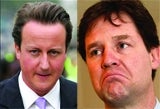Is this the beginning of the end of BBC Radio’s dominance?
Of all the items competing for the immediate attention of the new secretary of state for culture this morning, it is unlikely that the first quarter Rajar report was top of the pile. However, in it lies illustration of several likely conundrums for the new administration.

Today (13 May) saw the first state of the (radio) nation address of 2010 and one which demonstrates that a robust BBC still rules the airwaves.
The corporation registered a 56.5% slice of the radio market in the first quarter, up from 55.2% in the last three months of 2009 and an improvement on the 56.3% posted in the first three months of 2009.
This, it seems, at the expense of the commercial radio sector, which saw its share slide to 41.3%, down from 42.6% in the previous quarter and 41.6% last year (although reach did increase on the previous quarter and last year to 32.16 million).
Crucially, the commercial sector also lost some of its share of the advertiser-friendly 15-44 year-old market to the BBC. Commercial broadcasters saw their share of the young and young-at-heart listeners drop to 51.2% from 53.2% in the previous three month period and 51.6% last year. Conversely, the BBC’s share was up to 46.1%.
This information, coupled with data showing audience increases at Radios 1, 2, 5 Live and the under-threat 6 Music, will undoubtedly be causing consternation among commercial radio chiefs and, perhaps, turning heads at the Department of Culture Media and Sport.
Last year, commercial radio bosses accused the BBC of targeting young listeners by employing high-profile light entertainers such as Dermot O’Leary, beloved of young and old listeners, and shifting music policy to attract bigger audiences.
Although the incoming minister and his boss, Prime Minister David Cameron have not (yet) explicitly expressed the same concerns, a clue as to what the new Government might be thinking came in March when the BBC director general Mark Thompson launched a strategic review of the corporation. A proactive move, observers said at the time, to head off a likely shift in policy in the event of a Tory-led administration.
In addition to announcing plans to close 6 Music and the Asian Network, Thompson talked of the need to curb the corporation’s ambitions and “listen to legitimate concerns from commercial media players. Cameron has also talked previously about the need for the BBC to “retrench a bit and focus on what matters most”.
The commercial radio industry will have been taking note and encouragement of such utterances as it looks for clues as to what a Tory-led coalition will mean for them.
Mooted Tory plans to freeze the licence fee, improve accountability and openness at the corporation and check its commercial ambitions should be read as positive signs by the commercial radio industry.
Listeners will ultimately decide of course, and it may be that BBC radio audiences will continue to rise, but do not expect to see quite the same explicit high-profile listener grabs the BBC has partaken in via star-led marketing campaigns in the near future.
Chasing listeners at the expense of the licence fee-payer and to the detriment of the commercial sector is at odds with the new Government’s promised age of austerity in the public services.






